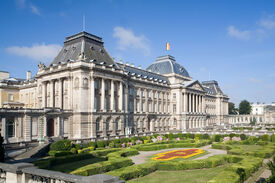| Palace Van Geldern | |
|---|---|
 | |
|
Built |
1765 |
|
Location |
Astana |
|
Role |
Seat of the Royal Landsraad |
Palace Van Geldern is one of the most prominent buildings in Astana. Originally built as the palace of the ducal house Van Geldern in the capital city, it was lately donated by them to the State. Since then, it is the seat of the Royal Landsraad, one of the two legislative bodies of New Tarajan, and a wonderful example of Tarajani architecture of the late XVIII century.
History[]
Palace Van Geldern was built under commission of Heinrich Van Geldern, XVth Duke of Eindhoven, from 1762 to 1765, year of its official inauguration, by the famous architect Wilhelm Van Wittel (also responsible for the contemporary part of the Royal Palace).
In the atmosphere of elegant and luxurious aristocratic life of the so-called Heinrichian Period, the goal of the Duke was to provide a new, magnificent residence for his family (the second most prestigious one in the Kingdom, soon after the Royal House itself) in the capital.

The Grand Music Hall, often used for international meetings and ceremonies.
House Van Geldern kept the full possession of the palace until the end of the Kingdom and the Revolution. With the rise of the People's Republic, the Palace, with all aristocratic properties, was confiscated, becoming the seat of the Communist Government (but not the Presidential Palace, a role which was conferred to the old Royal Palace).
When the Kingdom was finally restored in 1944, the Noble House donated the Palace as new seat for the Landsraad (which was previously located in a specific wing of the Royal Palace itself). Since then, Palace Van Geldern kept this role, with the addition also of the Royal Diet (until 2015): a proud mark of the power of Tarajani aristocracy and its role in the government.
The Landsraad[]
The Landsraad (literally "Council of the Land"), is the most important legislative body of the Kingdom, and part of its States General (Staten-Generaal).
Founded in 1561 by the Antanaresian lords who invaded the lands of the ancient Ajanic Empire, the Landsraad is composed by the Heads of State and Government (the Lords) of all the twenty-two States composing the Kingdom (in the case of the Royal States, by the respective Governors), thus representing all the Major Noble Houses of the Kingdom (the Major Houses are, indeed, all those represented in the Landsraad, and thus governing a State; Minor Houses are, instead, represented in the local Diets of the single States).

The Landsraad Hall.
Its role in the Tarajani political system is fundamental: the Landsraad is the main legislative body, with possibility to propose, discuss and approve laws independently or after a proposal of the Imperial Council or the Diet. It also advises the King in many occasions, votes the approval of the Minister of the Imperial and Royal House (the Grand Pensionary) after the elections, and has the power to advocate to itself the exclusive discussion and approval of laws considered of particular interest of the Kingdom, in case the Diet is falling under political obstructionism.
While previously its powers configured a clear, asymmetrical relation with the Royal Diet (the Diet had the obligation to submit the laws it has approved to the judgement of the Landsraad, while such an obligation did not exist for the Landsraad itself, which could have legislated without the intervention of the Diet), this relation greatly changed with the new constitutional reform promoted by King Friederick: now the Landsraad truly is the Upper Chamber of the Kingdom's States General, with equal power than the Royal Diet, and without the possibility to overcome it anymore.
Also, the Landsraad has an important juridical function: when chaired by the King, it is the highest level of judgement; it is also the only body with the power to judge the members of the aristocracy (as a second-grade court, the first one being the local Diet of the State to which the aristocrat belongs).